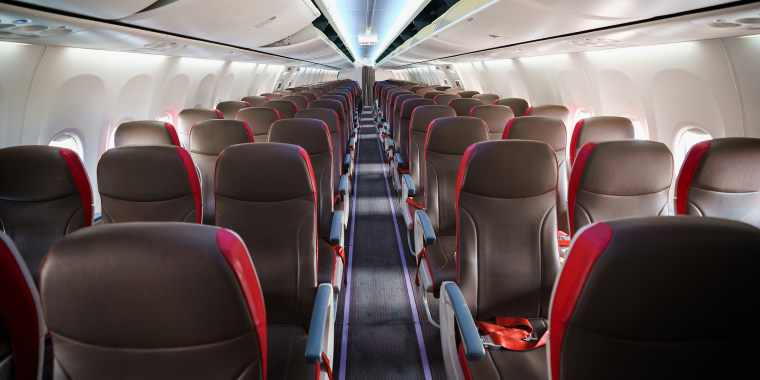The novel coronavirus outbreak has not only rocked financial markets, but it's also delivered a blow to the travel industry. Many airlines have suspended flights and waived cancellation and change fees in an attempt to keep COVID-19, the disease caused by the virus, from spreading.
With anxiety from passengers rising as cases of COVID-19 continue to emerge, airlines are taking extra precautions to minimize the risk of spreading coronavirus disease.
The International Air Transport Association published a list of guidelines that airports should be following to protect passengers and crew members from contracting COVID-19. While following these guidelines aren't mandatory, they serve as a baseline of suggestions for what air carriers should be doing to prevent the spread of the disease. These guidelines include regularly disinfecting aircraft after a flight, having crew members wear surgical masks and even screening passengers for their temperature.
And even before the coronavirus outbreak, airlines were expected to keep their planes clean to ensure the safety and well-being of their passengers and crew members. According to Brett Snyder, president of Cranky Concierge, a site that provides air travel assistance, the basic sanitation process includes a cursory clean to get trash off the ground, but it's usually not very in-depth since there's typically not much time between flights. If it's a long-haul flight, there's usually a deeper clean that includes wiping down surfaces.
But as COVID-19 continues to spread, certain airlines are changing their policies and procedures to help prevent the spread of the virus. "There are already some procedures in place that are above and beyond normal cleaning," said Snyder.
American Airlines
On March 4, American Airlines disclosed its “structured cleaning regimen,” and stated that the company’s cleaning practices “have always met or exceeded all (Centers for Disease Control and Prevention) guidelines.” The airline says it cleans aircraft daily “at key touchpoints” with an Environmental Protection Agency-approved disinfectant.
Under its enhanced cleaning process, American is putting a greater focus on international flights, with these aircraft getting a “30-point cleaning package” daily, along with other planes that have extra time on the ground. Those planes that stay overnight at airports will also get a more thorough cleaning for all hard surfaces, including tray tables and armrests.
Like other airlines, most of American’s fleet is equipped with high-efficiency particulate filters that the airline says “provides a complete air change approximately 15 to 30 times per hour, or once every two to four minutes.” And for now, American is giving hand sanitizer and sanitizing wipes to crew members on all international flights across the Pacific Ocean and to Italy, and it hopes to expand this practice to all flights.
In terms of in-flight food and drinks, American is instituting additional disinfection procedures on some international flights. This means that tableware, dishes, cutlery and glassware are being sanitized before washing and that the airline is discarding all unused inbound supplies. Staff is also sanitizing any inbound linen and headphones separately, along with carts and carriers.
For key international flights, American is eliminating self-serve snack and fruit baskets, and flight attendants will provide food and drinks upon request.
Delta Air Lines
Delta Air Lines is also taking serious steps to minimize spreading the disease. After consulting with the CDC, the World Health Organization and other health officials, Delta decided to begin “deploying a fogging technique with a highly effective, EPA-registered disinfectant on flights.” Since Feb. 29, Delta has implemented this technique on all U.S. flights from Asia, as well as “trans-Pacific flights” arriving in the U.S., and flights from Italy to Atlanta and New York's John F. Kennedy International Airport, which will continue until further notice. The fog contains EPA-registered disinfectant that is “rated to combat many communicable diseases.”
JetBlue
In addition to suspending flights and waiving change/cancellation fees, like many other airlines, JetBlue is taking some extra cleaning precautions. According to the company's site, it has created a “special response team” to monitor the situation in real time and is promoting healthy habits, such as hand-washing and other healthy practices, to crew members. As for the company's fleet, the airline is ensuring “compliance with aircraft cleaning procedures.”
Southwest Airlines
While Southwest hasn’t canceled or rescheduled any flights, the airline will continue to “closely monitor” the situation. In the meantime, Southwest said in a statement that they have established a program to keep its fleet clean, which includes tidying planes between flights, as well as having each aircraft undergo “a comprehensive program every night that includes cleaning, sanitizing, and disinfecting the aircraft cabin and lavatories.” Southwest's air circulation system also uses HEPA filters, which are used in hospitals.
United Airlines
United told TODAY that their current procedures for cleaning their planes are similar to the precautions they took during the 2014 Ebola outbreak. This includes conducting a wipe-down of hard surfaces — using a cleaning solution with disinfectant — that are touched by customers. In case there's a passenger with a confirmed diagnosis, the aircraft would “immediately undergo a deep cleaning, which includes washing ceilings and overhead bins and scrubbing the interior,” United Airlines spokesperson Charles Hobart told TODAY. Depending on the CDC’s further recommendations, United will assign an even more thorough cleaning process if necessary.
How can I keep myself safe on a flight?
If you can't avoid flying in the next few months, continue to practice good hand hygiene — just like you would on the ground. This includes frequent hand-washing and keeping disinfectant wipes or hand sanitizer with at least 60% alcohol in case you can't wash your hands. The CDC also has a list of everyday preventive actions to take.



